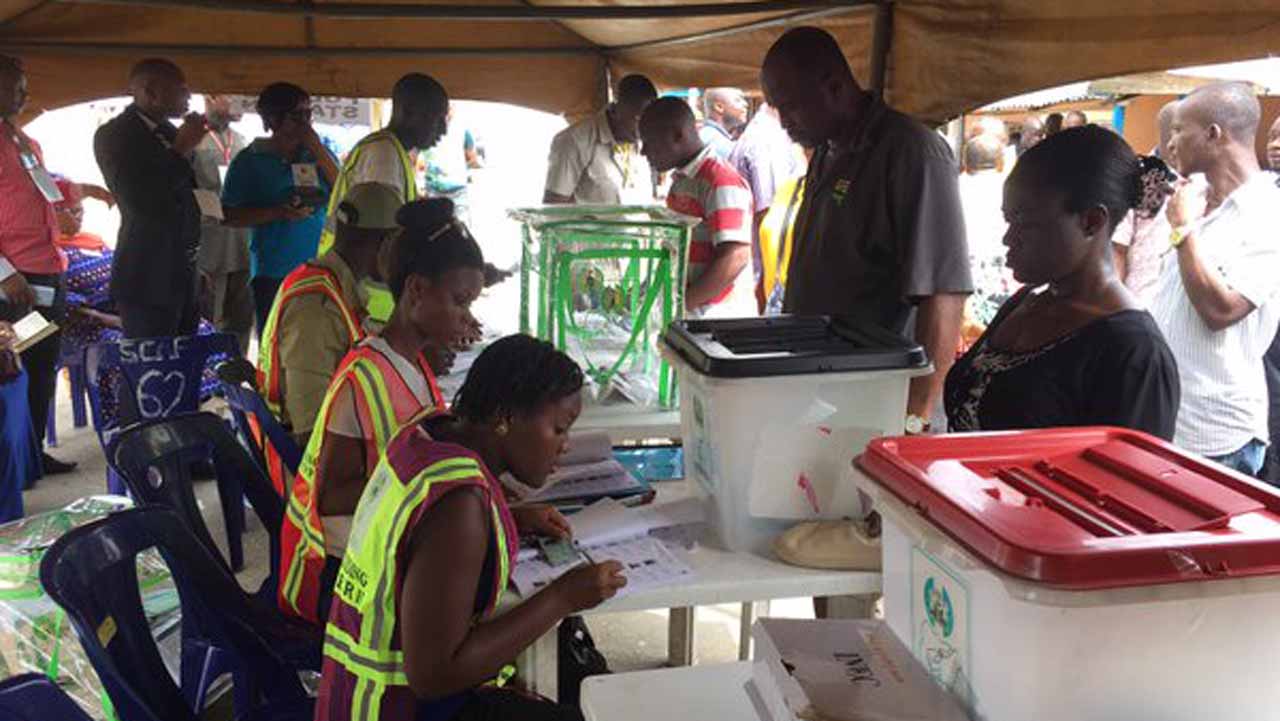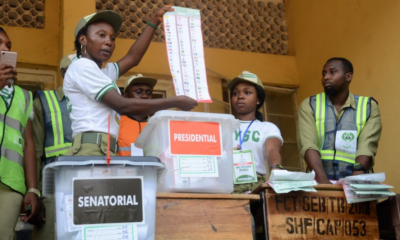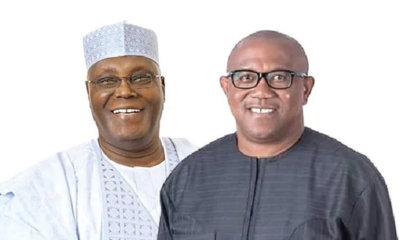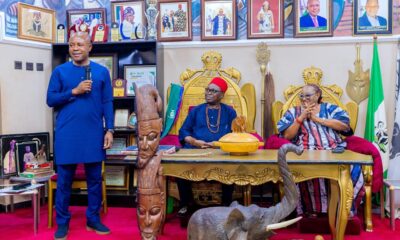GROpinion
What a newcomer must know & do to win elective position in South East Nigeria


By Anayo M. Nwosu
There are many young people out there desirous of contesting for various elective positions in Nigeria in order to make the desired difference.
Unfortunately, many of them especially those from the South East region don’t know how to go about it. I have striven to assist by penning down the following:
UNDERSTANDING THE TERRAIN:
The Igbos live in families. A handful of related nuclear families make up Umunna which is the primary organisational structure in Igbo land.
Umunna is headed by a natural Obi who is usually the first son of the patrilineal families that joined to form the Umunna. The obi’s father must have been a first son. However, an obi while alive could pronounce any of his sons his successor. Upon death, the pronounced becomes the obi and shall be succeeded by his first son was disinherited by his own father.
The Obi is like the ceremonial head of the Umunna or a union of extended patrilineal families. There is also an elected chairman and other executives who together with the obi rule the ụmụnna.
A handful of related Umunnas makes a community.
A community, like an Umunna, is governed by an Obi with elected executives headed by a president fondly called President General or PG. The community obi is the first son of the first Umunna regarded as the first son of their progenitor.
One or few communities are grouped as a ward depending on the constituent population.
Based on the population as delineated by electoral body, a ward or group of wards produces a councillor for the local government.
Each ward could have one or more polling stations depending on the population of registered voters.
Related communities make up a quarter or a larger community.
Some larger communities or quarters, in some states like Imo, have been elevated to autonomous communities which is equivalent to a town.
A union of quarters makes up a town which has a natural or selected traditional ruler known as Igwe, Eze or Obi. Together with the traditional ruler, the town union executives led by a president governs the town.
A town or a group of towns makes up a local government area (LGA).
The local government is governed by a chairman working together with elected councillors.
A local government chairmanship candidate must win the majority votes cast in his/her LGA and must also win 1/3 of votes cast in at least 2/3 of council wards.
In Nigeria, a state is an agglomeration of local government areas. There are 774 LGAs in Nigeria.
The population size of a local government area determines how many state legislators it would produce while a local government or more consists a federal constituency which produces a member of Federal House of Representatives.
All the local governments in a state are grouped into three zones namely: north, central and south senatorial zones. Each zone produces a senator and no state produces more than three senators.
In state elections, a governorship candidate must win the majority votes cast in his state and one-third of votes cast in 2/3 of the local government areas of his state. Also, the presidential candidate must not only win the majority votes cast in the whole country but also must win 1/3 of votes cast in 2/3 of the states of the federation.
WHERE THE WORK LIES
A newcomer to politics must do some ground work. Depending on his or her target political office, an aspirant must make a list of the names, phone numbers and addresses of all the Obis and Chairmen of every Umunna in each community in every town. He/she should also have a database of all the Obis and political heads of each Community, Quarter, Autonomous Community or Town. He should be in contact with them as out of touch is out of touch is out of votes.
A smart aspirant should include in his/her database, the details of former elected presidents of the Communities, Quarters and Town unions. They may be out of office but could be very influential.
The above mentioned are the building blocks of the electorates regarded as barracks that remains when “soldiers or politicians come and go”
A serious aspirant in a state like Anambra would have to start early to meet with all mentioned strata of the electorates. Starting with the traditional rulers, town union executives, community obis and their executives, obi Umunna and their executives.
The aspirant must approach each stratum as afore listed with minimum of two cartoons of beer, one cartoons of soft drinks and a bottle of good hot drink.
Let no newcomer be shocked if the same electorates he or she is planning to redeem ask for rice, salt, tomatoes or even raw cash. They have been used to such since 1957. Spraying money during campaigns is a tradition in South East and elsewhere in Nigeria. One can lose an election in some areas because he refused to provide the essential commodities.
Recall that had to feed the 5,000 to drive home his message. That singular act attracted more followers the next day. Remember that after eating to their fill, the appreciative crowd wanted to crown him a king there and then. He had to disappear to avoid that.
However, the aspirant needs to make his message very clear and sweet to the ears. During each visit to the stakeholders, he would introduce himself properly and talk about his manifestoes which must include a solution to a nagging or general problem of the hosts. Hence the need for a thorough research.
The aspirant should request to address the whole assembly of Umunna if the target political post is House of Assembly or Local Government Chairman or to meet with the entire community if the aspiration is for House of Representative or Senate or even Governorship. A paid town crier is usually at his service.
Quarter or Community level general assembly address is very effective after all the traditional and political heads have been visited in their homes in what Igbos called “ịkpụpụlụ okpu” or “doffing the cap” or paying due respect to the deserving.
These courtesy meetings and the gifts require money and vehiclar logistics which the aspirant must find means of financing.
Fundraiser and crowd funding from people who believe in the message of the contestant would come handy. It would be very difficult for a young man or woman with a mission not to ask for financial assistance for the mission.
The aspirant should have a representative or co-ordinator at the Ụmụnna or Community level. If he is lucky to pick a loyal, hard working and responsible rep at this level, who energetically canvass for him, the job is half done. In most cases, the representatives or agents across the electoral constituency, as known as structure, need to be paid some allowances for transport and personal requirements even if they work as volunteers.
Aside from his agents or pointsmen, there are scattered in all towns, many influencers from various communities and a smart aspirant must have a list of them.
One may not be able to convert these opinion leaders or influencers but they must be spoken to for support.
A serious aspirant must have a list of all the owners of beer parlours in a town and devise means to reach out for their support. They are the surest sources of intelligence or critical political information.
THE CHURCH FACTOR
The biggest unregistered political parties in Igbo land are the religious bodies. For instance, anyone who makes an enemy of Catholic Church in Imo, Anambra and Enugu States can never win any election through free and fair means.
The faithfuls rarely disobey their bishops and parish priests.
A detailed politician should have a list of all the parish priests of churches of different denominations at the archdeaconry or deanery levels. The men of God no longer mind their ecclesiastial businesses. They must be met either privately or publicly at their functions to plead for their understanding.
The aspirant should ready to appear godly and must prove prior financial support for the church or promptly demonstrate one.
OBAMA STYLE
An aspirant could raise an army of youths, mostly students and unemployed to canvass support for him or her in their various villages.
An aspirant should download the voters register whenever INEC publishes it and use technology to reach the electorates via SMS and direct phone calls. He must maintain call centres manned by volunteers or paid staff who shall daily engage voters.
Jehova Witness method of house to house campaign to voters on INEC register makes serious sense. Each voter spoken to is ticked off and be called at at least twice before election day.
From INEC records, less than 250,000 votes are all that is required to win a governorship election in the south East and a little less for legislative positions.
One should not overly rely on this modern approach due to the near primitive setup of our clime but some votes could be garnered from such efforts.
RRELIANCE ON GODFATHERS
There are everywhere in Igbo land, many political heavy weights who over the years, have built election winning structures in their towns. They also have influence all over their senatorial zones or state.
These godfathers have all the heads of Ụmụnna, Community and Towns on their payroll. They also have many opinion leaders at their beck and call. Some are on monthly salaries. They award scholarships and settle medical bills of their fellow citizens. They announce or advertise such good deeds for accolades. Some of them are employers of labour and are generally regarded as go-to chiefs. People normally would ask them who to vote for and they gladly make choices for them.
It is difficult to win a constituency where these chieftains are holding sway.
Late Lamidi Adedibu and Late Oloye Saraki of Oyo and Kwara respectively typified life godfathers that have a statewide influence.
We all know the living godfathers in our localities. They boast about it and are easy to identify.
An aspirant who needs to win in the areas under the firm control of the political fixers must go beg them or “pụọ rụ isi anị” to the votelords or would be disgraced.
These votelords control machinery of terror and have a way of getting INEC to employ their stooges as adhoc staff during elections to help them achieve their objectives. They are so powerful to influence the postings of law enforcement agencies heads in their various states or area commands.
When a man promises or collect huge funds from a political party or contestants to deliver his constituency, note that the man is a votelord.
The only way to neutralize the godfather is by liquidation via federal might or by death. But they don’t usually succumb to bullets or to matchete wielding assassins as they are highly fortified. They have odeshi and ọdụ ụna and can only die naturally.
However, an aspirant could scheme to get to his political destination through the help of an outgoing incumbent as President Yar’Adua’s, Abia’s Gov. Okezie Ikpeazụ, Anambra Gov Willie Obiano and Enugu’s Gov Ugwuanyi. In this case the incumbent would lap or carry a newcomer on his back, foot all the expenses, get the support of all key stakeholders to get the newcomer elected.
A newcomer like Imo’s Ugwumba Uche Nwosu might not be that lucky chiefly because of the baggage of his sponsor and the fact that Catholic Church and notable principalities feel insulted and have decided not to see that happen.
WHEN DETERMINATION PAYS
Seeing the enormous work or uphill task they need to climb to win an election, the hitherto zealous young persons either back out as “lazy youths” or kowtow to the votelords or godfathers who get them to swear to dangerous oaths and evil agreements.
Those youths who are lucky to have been appointed to federal appointments could have it easier by either using the federal terror logistics to cow the votelords or get the president or the state governor to negotiate with the godfather on their behalf. Some oil wells, juicy contracts or a simple blackmail would do the trick.
Given the state of our enlightenment and political awareness, it would be very difficult for a self promoted youth to immediately declare to contest for an elective position and win in the first year of trial. The desiring aspirant needs to start early enough to build own structure.
It requires work hard.
More crucially, a newcomer must invest in ways of gathering evidence of rigging by opponents . Investment in mystery camera and infiltration of votelords’ camp would be rewarding in court.
Vigilance is also key because the godfathers resort to rigging when they notice that their candidates are losing. They must deliver or risk being demystified.
There is nothing wrong in organising an army of young people to watch out for thugs who come to snatch ballot boxes. The thugs could be given a corrective beating.
All things being equal, the message is that an aspirant needs to identify all the religious, traditional, social and economic units in his electoral constituency and devise ways of conveying his message.
Two to four years of preparation may be required except if the aspirant is ready to be compromised or be helped by votelords and at a huge cost.
The important thing is for an aspirant to come up with plans and a message. Who knows? The electorates might be hooked up to the message earlier than envisaged.
But the message must resonate and cut across all religious, ethnic and sectional divides for it make desired impact.
Let that articulate, charismatic, resourcesful and dogged youth stand up and be counted. That youth who is excellent in achieving great results through people is the one that can succeed.
-



 GRPolitics3 days ago
GRPolitics3 days agoLet the People’s Voice Stand: A High‑Assertiveness Call to Democratic Integrity in the Digital Age
-



 Spotlight4 days ago
Spotlight4 days agoProphetic Outlook for 2026: Help Is on the Way
-



 GRPolitics4 days ago
GRPolitics4 days agoAmidst Atiku and Obi in ADC, Bola Ahmed Tinubu Retains a Significant Structural Advantage Ahead of the 2027 Election – A Data‑Driven Assessment
-



 Culture3 days ago
Culture3 days agoGovernor Mbah Visits Igwe Greg Ugwu, Enyi 1 of Attakwu, Nkanu West LGA








